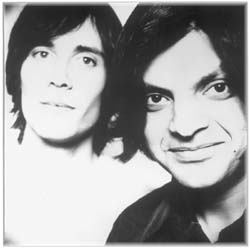![[Metroactive Music]](/music/gifs/music468.gif)
![[Metroactive Music]](/music/gifs/music468.gif)
[ Music Index | Metro | Metroactive Central | Archives ]
Around the Cornershop
 They Gotta Have It: Cornershop has been dubbed the band of the moment by overeager critics. Being the critics' darling isn't necessarily a healthy thing for a dance band--just ask Cornershop By Gina Arnold EVERY YEAR, there is one record or band that rock critics get together to proclaim as sheer genius. If not the best (or bestselling), it is, they declare with one voice, the edgiest and most influential act in existence, the one above all others that exudes the most merit. I'm not sure where this type of thing gets started, but where it finishes up is in the Top 10 critics' polls, where such artists are lauded with rhetorical abandon. Once a darling has been declared, few critics dare to rock the boat and say, in essence, that the emperor has no clothes. Sometimes--for instance, the year it was PJ Harvey's turn--the critical consensus is entirely correct. Other times, however, things aren't quite as clear-cut. Last year, Beck (with Odelay) was anointed, closely followed by DJ Shadow and Sleater-Kinney. All three are artists who, if not exactly stark naked, may not be wearing quite as much finery as their champions have declared. This year, the band of note is Cornershop, a folky-trippy English dance group led by Indian DJ and singer Tjinder Singh. When I Was Born for the Seventh Time (Luaka Bop/Warner Bros.) is Cornershop's third album, following 1995's acclaimed Woman Gotta Have It, and it has already inspired an awe-inspiring array of positive reviews. Rolling Stone gave it four stars; Spin led its review section with Cornershop. In short, Cornershop is well on its way to Pazz and Jop supremacy (that being the prestigious year-end critics' poll in the Village Voice). But is the band really good, or is it merely, to quote another critics' darling, "bandwagonesque"? Alas, I fear it is the latter. Cornershop has a trendy gimmick--Punjab-Indian sound shadings, including sitar, tamboura and dholki--and it also has a bright and infectious pop single called "Brimful of Asha." Although being Indian is in these days (and indeed, as an additive to Western pop, it is a welcome presence), when it comes to its role as metaphorical Emperor, I doubt that Cornershop is clad warmly enough for winter. CORNERSHOP'S sound could be termed "supercanned," i.e., the kind of cheesy lo-fi sonics that splice the warm old buzz of '50s vinyl records with newer sound techniques. "Brimful of Asha" is a groovy little number that is also a judicious cross between "Sweet Jane" and Jonathan Richman's classic "Roadrunner." Although its verses are a little unintelligible ("Asha" is a reference to Asha Bhosle, one of India's most popular singers), its chorus--"Everybody needs a bosom for a pillow sometimes"--has a wonderful ring to it and uses just the kind of offbeat meter that makes Bob Dylan songs so effective. Unfortunately, "Brimful of Asha" is by far the album's highlight. The rest of the record is thoroughly underwritten. "Sleep on the Left Side" is remarkably similar to "Asha" in tone and tempo--only it lacks the nice little guitar lick. Only "Good to Be on the Road Back Home"--a duet with Tarnation's Paula Frazer that is another Velvet Underground-like number with country overtones (thinks Mekons with sitar)--seems to have been composed at all. The rest of the album is total studio-made filler: cheery samples and goofy tape loops that make OK background music but aren't so great for either dancing, singing or playing along to. "When the Light Appears Boy" includes a poem written and read by the late Allen Ginsberg. "Candyman" comes complete with a straight-ahead rap by Justin Warfield. And the record ends with a version of the Beatles classic "Norwegian Wood" sung in Punjabi--perhaps Singh's nod to the fact that "Norwegian Wood" (and the rest of Rubber Soul) was the first album to use Indian music in Western pop, at least until Monsoon and Kula Shakur came along. For all its lengthy, trancelike rhythms, Cornershop's new album is full of indie-rock experimentation. A friend of mine notes that When I Was Born for the Seventh Time sounds great when you're stoned, which may well be true. The feel of it is very close to that of De La Soul's first record, 3 Feet High and Rising, another stoner classic, albeit a more groundbreaking one. Cornershop isn't a bad band, and in fact, judging by "Brimful of Asha," it has a lot of promise. But overpraising Cornershop isn't doing the band any favors. In fact, too many people who buy it for the single or its great reviews may be turned off by Cornershop's spaced-out, tinny and eclectic meanderings. Critical darling it may be--but a popular success? I doubt it. [ Metro | Metroactive Central | Archives ]
| ||||||||||||||||||||||||||||||
Copyright © Metro Publishing Inc. Maintained by Boulevards New Media.